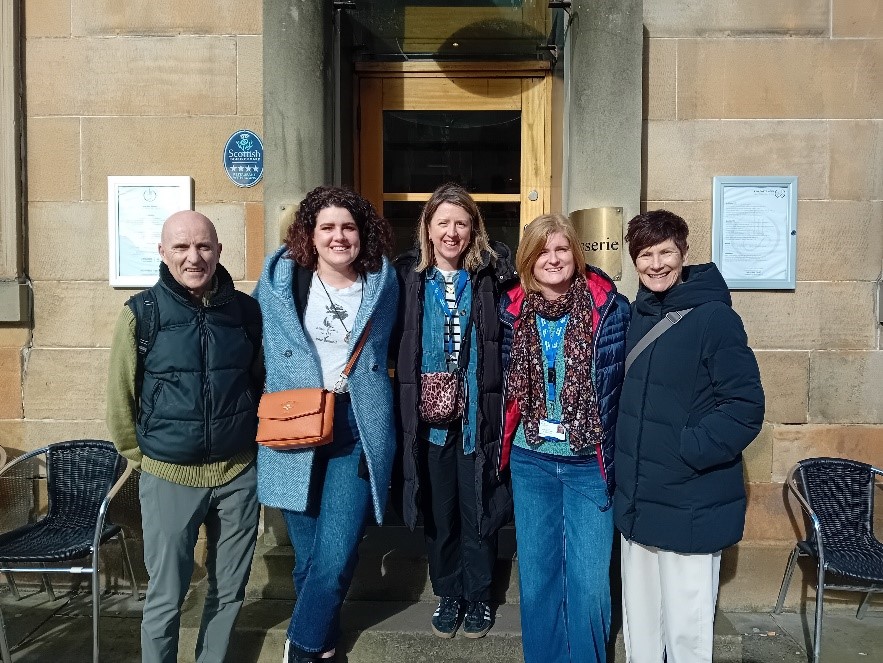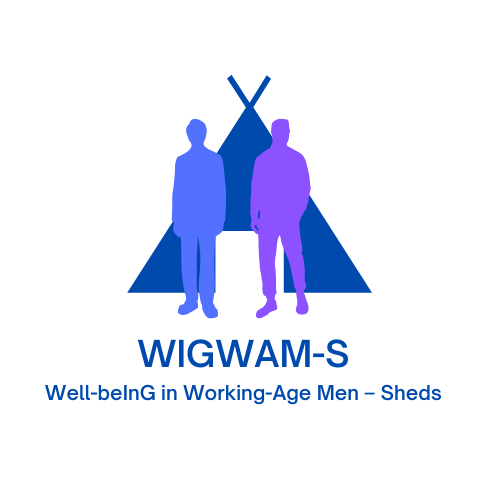WIGWAM-S
WIGWAM-S - Wellbeing in dIsadvantaGed, Working Age Men – Sheds
A co-design community project to develop realist programme theories around the impact of Men’s Sheds on the positive health and wellbeing of socially disadvantaged, working-age men.
Dates
October 2024 – September 2025
Funder
Chief Scientist Office
Contact
To find out more and be added to our mailing list contact WIGWAMS@gcu.ac.uk
March 2025
Last week the WIGWAM-S team welcomed academics from Ireland's South East Technological University to explore how community initiatives can support men's health and wellbeing.

L-R are Dr Noel Richardson, Dr Aisling McGrath, Dr Dani Hutcheon, Dr Julie Cowie and Professor Niamh Murphy.
Dr Julie Cowie, Dr Danielle Hutcheon and Professor Artur Steiner joined the researchers to share knowledge on how best to support the health and wellbeing of marginalised groups. They focused on the work researchers at both institutions have conducted into the Men's Shed initiative and how it can be used to support the health and wellbeing of working-age, disadvantaged men. Their work builds on our WIGWAM-S (WellbeInG in Working Age Men – Sheds) project, led by Dr Cowie.
Dr Cowie said: "We've really benefited from having informative discussions with our colleagues from SETU, sharing experiences of researching men's health and wellbeing and learning about similarities and differences between the Irish and Scottish contexts.''
Happy New Year from the WIGWAM-S team
As we head into a new year and month four of the project, it’s nice to reflect on what we’ve achieved so far. Our first few months have seen the team travelling round Ayrshire and Arran, and Forth Valley regions chatting to people about what they do, what the WIGMAM-S project is all about and events coming up in 2025.
Organisations we’ve spoken to include:
- The Ayrshire Community Trust (TACT) in Saltcoats
- The Beith Trust
- The Falkirk Foundation (Falkirk football club)
- The Hope Hub (Denny)
- Auchinleck Community Development Initiative
- Wee County Men’s Shed
- The 3 Towns Men’s Shed
- Garnock Valley Men’s Shed
We have lots of further visits already in the diary for January and in February, we’ll be hosting our first WIGWAM-S café at the Boswell Centre, Auchinleck where we’ll be inviting local men for a breakfast roll and tea/coffee to chat about what they’d like to see in their area to help them live well, and support health and wellbeing.
Watch this space for more details.
Do get in touch with us if you’re interested in hearing more about the project (wigwams@gcu.ac.uk).
The WIGWAM-S Team

Update 11 November 2024
Reflections on month one:
We have hit the ground running and are very excited to be getting underway with the WIGWAM-S project. Key activities we’ve been up to this month include:
- Presenting the project at the Scottish Men’s Shed Association AGM in Perth
- Meeting community groups to discuss plans for our pop-up café events in the new year
- Getting underway with our scoping review of the literature on community initiatives to support men with health and wellbeing
We’ve also been fortunate to be successful in acquiring funding to network with researchers on Men’s Sheds in Germany and Ireland to share knowledge and experiences of men’s community interventions pan-Europe.
Looking forward to the next couple of months we will be continuing to forge relationships with communities with a view to setting up dates for our pop-up cafes next year. From now until Christmas the scoping review will be also be a key focus such that we can present some of the findings at our cafes.
Lastly, Julie (project principal investigator) will be running the Glasgow MoRun 10K (supporting Movember and men’s health) on Sunday 24 November. We wish her well!
Do get in touch with us if you’re interested in hearing more about the project (wigwams@gcu.ac.uk).
The WIGWAM-S Team

Men living in disadvantaged areas are at risk of poor health outcomes, partly because they are hard to engage in healthy activities, and more likely to be involved in harmful behaviours such as sedentary lifestyles or drug/alcohol use, and are less likely than women to seek health advice.
Post-COVID, working-age men aged 16-64 years who are living in disadvantaged areas are also experiencing high levels of social isolation and loneliness. Men’s Sheds, a community-based initiative, shows promise in supporting health and wellbeing needs, particularly in elderly men.
In this development study, we will work collaboratively with Sheds and men living in disadvantaged communities as well as relevant health professionals and support organisations.
We want to find out what works well in current Sheds, the reasons why and for whom, and what aspects of Sheds lead to what outcomes. We will learn from this knowledge to propose how Sheds could better support younger, working-age men living in disadvantaged areas.
Findings from our study will be used to design a larger project where we will test and refine our theories about how Sheds might work best for socially disadvantaged men.
This new knowledge is important, as before investing in this approach and offering support to working-age men’s health in disadvantaged areas, policymakers need to know whether and how community-based interventions work.
Project Lead
Project team
- Professor Helen Mason - Glasgow Caledonian University
- Professor Artur Steiner - Glasgow Caledonian University
- Dr Danielle Hutcheon - Glasgow Caledonian University
- Jack Rendall - Glasgow Caledonian University
- Dr Sinead Currie - Stirling University
